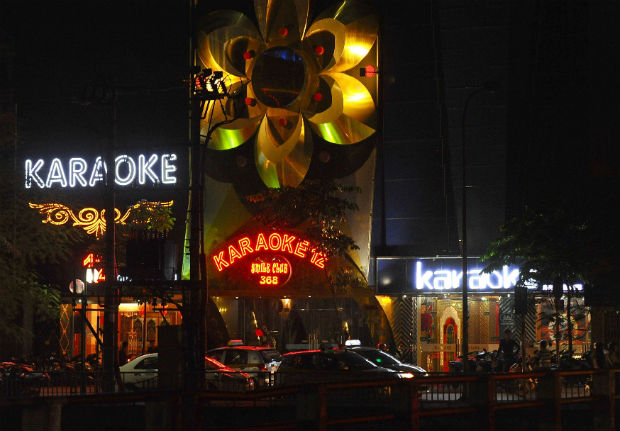
This picture taken on September 15, 2014 shows a karaoke bar at night time in Hanoi. Prostitution remains illegal in Vietnam, a traditional society still dominated by Confucian social mores, but a fierce debate over whether to legalize and regulate the industry has sprung up online and in the official press. AFP
HANOI – For Vietnamese sex workers like Do Thi Oanh, being caught touting for business used to carry a long stint in forced “rehabilitation,” but as fines replace detention, many detect a shifting attitude towards the world’s oldest profession.
In 2008, Oanh was sent to one of Vietnam’s notorious rehabilitation camps on the outskirts of Hanoi, joining hundreds of prostitutes and drug addicts detained without conviction for taking part in a “social evil.”
The 32-year-old was held for 18 months in the center where detainees worked for free raising poultry, gardening or making handicrafts.
Last year, Vietnam suddenly replaced compulsory rehab for sex workers with fines of between $25 to $100, releasing hundreds of people from centers across the country.
Oanh, whose name has been changed to protect her identity, said the legal move points to a wider liberalizing attitude towards sex work in the communist nation.
“I think that society today is much more tolerant with people like me,” said Oanh, who has herself given up prostitution but remains in sex work, running a massage parlor in the capital.
Prostitution is illegal in Vietnam, but hundreds of thousands of sex workers ply their trade in a deeply conservative society which is still dominated by Confucian social mores.
Prostitution is considered a social evil, along with drug addiction and homosexuality.
Drug addicts continue to be sent to compulsory rehab.
But in recent months a fierce debate over whether to legalize and regulate the sex industry has sprung up online and in the official press, airing views that were long considered taboo.
Even the National Assembly is due to address the issue at its next session in October.
Brothel boom
Despite decades of official suppression, Vietnam’s sex industry has flourished in parallel with the economy since market reforms of the late 1980s opened up the socialist system to international trade and investment.
Researchers estimate there are around 200,000 sex workers in Vietnam, full-time or occasional, of whom up to 40 percent are believed to be HIV-positive.
“We should legalize prostitution because it is part of human rights. Everybody has the right to enjoy sex,” said sociologist Le Quang Binh.
Legalization could help “protect sex workers and their clients and bring in revenue for the government through taxes,” he added.
In the southern business hub of Ho Chi Minh City, police statistics show there are at least 30,000 establishments linked to the sex trade – from massage parlors and karaoke lounges to actual brothels.
Many popular Vietnamese beach towns even have open brothels operating under the protection of criminal gangs, sometimes with the complicity of corrupt local officials.
“As we are not able to eradicate prostitution, we will have to manage it,” said Trinh Thi Khiet, a Hanoi-based parliamentarian.
“We shouldn’t encourage the sex trade but we have to look at this issue in the face. We need to save women from mafia networks.”
The debate over how to tackle prostitution, however, remains sharply polarized.
Authorities in Ho Chi Minh City last year proposed to implement experimental “red zones”- not yet in place – where prostitution would be allowed or at least tolerated.
But in Hanoi authorities have suggested publicly disclosing the names of punters caught by police to deter others from buying sex.
Despite high-profile “clean-up” campaigns, prostitutes operate openly on major roads in the city, much to the distress of some residents.
Nguyen Thi Hoa, who owns a clothes shop, says she has stopped listening to regular news reports showing “half-naked young girls” arrested in police raids on hotels.
“I see the police arrest prostitutes one day… the next day they’re back on the streets… The fight against prostitution has made hardly any progress,” she said.
‘Too sensitive’
While objections to prostitution abound, sociologists urge a pragmatic response to an age-old industry.
“We are totally incapable of controlling prostitution,” said Khuat Thu Hong, director of the Institute for Social Development Studies.
“We have to accept the truth,” she said, adding the “oldest profession in the world” would only disappear “when humans no longer exist.”
“We must not penalize it… I support legalization because it would help to combat trafficking in women,” she added.
And while Vietnamese children continue to learn in school that the “social evil” of prostitution destroys moral and cultural values , the taboo around sex will remain an obstacle to legalization.
For now, the government line is that “prostitution cannot be considered a job”, according to Le Duc Hien, deputy director in charge of the fight against vices within the labor ministry.
“Legalization is really a great challenge for us,” she said, adding that “this issue is still too sensitive” in Vietnam.